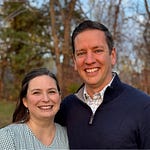TRANSCRIPT
Shanxi: Hello, this is Shanxi Omoniyi, host of MPE’s “Homeschool Hints” podcast to encourage you wherever you may be on your homeschool journey.
Today we’re talking with Annette Vaughn, who will share her experience with field trips in the Kansas City area and things that homeschoolers should consider when planning their next field trip.
So Annette, take it away! Can you give us a brief account of your homeschool journey and your experience planning and organizing field trips?
Annette: Yes, absolutely. Well, thank you so much for having me on here. I do love to talk about field trips. I’m a homeschool mom of three boys. So we have sixth grade, fourth grade, and second grade. We have been homeschooling since my oldest was in second grade. And I very quickly realized that a big part of our learning was going to be in addition to our traditional curriculum.
Bring able to get out there and really experience all kinds of things that our area has to offer. And I think that’s so true for so many families of just really embracing all those learning opportunities that we have not only in the classroom, but outside the classroom.
Shanxi: So from your experience, what have been some of your favorite field trips or categories of local field trips?
Annette: Well, I first think we are so blessed to live in an area that has so many different options. And for our family, I’ve really found there to be several big categories, big buckets of field trips that we’ve been able to find so many opportunities for. The first being, I think, just fun things, fun athletic things. We’ve got trampoline parks and open gyms and kids skate free, kids bowl free, and tons of fabulous parks. And so just kind of the outdoor piece.
And then I think there’s that category of science and nature. We have the Deanna Rose Farmstead, Timber Ridge Adventure Center, Powell Gardens, Shatto Milk Farm, and many of these I don’t think are necessarily unknown.
To listeners, if you live in the Kansas City area, you’re probably familiar with so many of these. For the bucket of history, there are forts, there’s monuments, all kinds of historical pieces like that. In particular, Fort Osage in our area is fantastic. And then really, just even community options of your typical police station, fire station.
And so a lot of the opportunities in our area are not necessarily anything that is unknown. It’s just a matter of really sitting down and thinking through what type of experience do you want to have for your kids or for the group of kids that you’re working with, and then how do I identify what we already have available in our community? Because there is so much.
Shanxi: Yes, sometimes it's like there's too many options and now it's a matter of whittling down which one can we reasonably do in the limited time that we have. So any challenges or things that you wished you’d known about planning field trips, maybe as you were starting compared to where you are today?
Annette: Yeah, I think some of the challenges are definitely just thinking through things a little bit in advance. One being thinking through the age of your kids or the age of the kids that are going to be in the group going with you. Because obviously, picking something during a nap time, that’s not going to necessarily work.
And so I would definitely say to think about that ahead of time and have realistic expectations. Isn’t that the key with so much of homeschooling? Realistic expectations of recognizing you’re not going to necessarily be able to do everything at every site that you go to.
It’s not going to be perfect. There’s probably going to be crying involved. Who knows? But just having those realistic expectations of starting small, starting simple, and recognizing the whole experience itself of going somewhere and experiencing something new, that’s a learning opportunity too.
And how do we handle challenges or disappointments or things like that, that come up in the course of trying to do something, that’s just a learning opportunity.
A piece of the puzzle that I would say, and just not overdoing it. Remembering the whole point of why you’re doing a field trip: to learn and to have a change of scenery and to have an opportunity to build great memories with your kids and also have some great social connections with other families that may be going with you or other individuals that you’re interacting with. So thinking through those things in advance, I think, is very helpful.
Shanxi: Yes. And I know another really popular question around field trips is, how do I make these affordable for my family? What are some ways that maybe I could cut costs or save money? What are your experiences with that?
Annette: I am all about doing field trips on a budget. And I think many folks might be surprised at how many free field trip options there are in the area. And I’m sure you’ll link some things in the show notes to resources that we have, but even just a simple Googling of free field trips in Kansas City, there are so many.
And then within that, there’s a lot of different places for field trips that even have reduced days of the week. For example, Deanna Rose in the afternoons, Monday through Thursday after 2 p.m., it’s free. And of course, you know, maybe that’s an ideal time for you to visit. That’s just one example of researching and getting on the websites and seeing what’s free or maybe there’s a particular day of the week that’s free if budget is a real concern for your family. There’s so much that can be done there.
Another thing that I’ve discovered is there’s wonderful, wonderful group discounts when you go with friends. And sometimes the minimum number is even as low as 10 kids. So getting two or three families together, oftentimes you will meet that minimum, but group discounts.
And then when I’m researching field trips, I always look for the school field trip category and see what the reduced rate is for schools. Because if you call and ask, oftentimes the school rate will be honored for homeschoolers as well.
I’ve also noticed that when you ask, oftentimes the parents - because we are the teachers - if it’s a situation where teachers are able to enter the field trip at no cost or a reduced cost, parents can have that same benefit at many places because again, we are the teachers. So that’s something that I would recommend if you’re trying to stick to a budget.
Another thing is - and I think this probably goes with any outing that we would do - packing your lunch, packing your snacks. A free field trip can get very expensive very quickly.
If you’re not prepared and you end up buying the expensive lunch options or drive-through along the way or whatever it is. But all pro moms out there probably knows: always pack your lunch, always have food.
And there’s so many wonderful parks in the area too, that even if food is not allowed to be brought into the particular area that you’re going, the parking lot lunch, the find-a-park-nearby lunch, that’s a great option.
And then I think even outside our immediate area, there are some options for families to explore.
There’s something called Every Kid Outdoors, which gives families of fourth-graders - so the fourth-grader, if you have a fourth-grader - the entire family access to federal parks and land and waters. So you can look up online what that might be.
We may not have quite as many of those in Missouri or Kansas, but if you’re going on vacation and you’re going to be near one of those sites and you have a fourth-grader, that’s a really good opportunity to save quite a bit on what admission would be. So that is available online.
I’ve also noticed for families of lower income, if they are on the SNAP benefits, there are some options for free or reduced entrance fees to museums and some other educational sites. So for families in that particular situation, that’s definitely worth exploring as well.
And I think when you’re looking at saving money, to me, it’s a balancing act. There’s so many great free options, but there are some that maybe are not free or a little bit pricier. And so just balancing that out of maybe, looking for as many of those free options as possible so that when you have something that’s a little bit more expensive, you can have a few dollars set back and budgeted to be able to do some of those other options as well.
Shanxi: I love that suggestion. That’s really great. If you don’t mind my asking, what do you think is a reasonable budget, like per year, for field trips that you think families could set aside, just in the spirit of thinking ahead and planning for those, like you said, extra special events?
Annette: For me, I actually plan a lot of field trips for groups that we are involved in. And then the summers we do it weekly, so it’s quite often. In the off season, it’s more of once a month.
So my first question usually is trying to get a sense of what everyone’s budget is in the group that I typically go with because everyone’s finances are different.
Some may be on a very, very tight budget. Some may have a lot more wriggle room with that. So I try to figure out what that is.
When I’m looking at individual outings, I try to keep it between $5-10 per child. More on the $5 side if possible.
Again, it depends on the family size too. If you have two kids, $20 is a lot different than the family with five kids - that’s $50. So that’s a consideration to make.
So I really think each family ideally has to come up with what their own budget might be and then figure out a way to work within that.
But I almost consider it more on a monthly basis than a yearly basis because there are certain times of the year where you might want to do more in the summer than you do in the fall.
But planning for that and having that as an expense, an expenditure that you set aside, just like you do for whatever you budget for curriculum, I think is an excellent way to do it.
Because you’re giving yourself permission to be able to go and do these things that are so meaningful in your homeschool experience without feeling guilty for spending the money. Without feeling like you’re cutting yourself short in another area.
If you just really plan, set that budget and know that’s what it’s there for, and it’s just as essential to get out and do things like that as it is our core curriculum.
Shanxi: Are there any tips you would suggest for just planning ahead and organizing these field trips?
Annette: I have several tips that I’ve learned through the years that I feel have been very helpful. And I think the first thing is just figuring out what your rhythm is going to be for field trips. During the school year for you, that might be we’re going to try to do one thing a month.
And that’s probably outside your normal meetup at the park, or go to the library, things planned outing, maybe it’s once a month, is reasonable for you.
And if you can do more, that’s excellent. But determining that ahead, maybe it’s the first Friday of every month. That’s when we’ve got time to do it during the school year.
If you do a typical school-year schedule, I recognize there are families that do year-round school as well. So that’s definitely a different dynamic.
And then maybe summertime is when you have an opportunity to do things more often once a week.
For us, this is our third year of planning what we call Terrific Tuesdays in the summer. And so it started out with just a small group of friends wanting to do something planned with our kids.
Once a week in the summer, and so we just called it Terrific Tuesdays. And the kids just really came to know, “OK, every Tuesday there is going to be something,” and it feels huge to them. It might not be super huge, but it’s something to look forward to every week.
And it’s grown to where I think we probably have 20 or more families doing that now.
But you know, bigger is not always better. If it’s you and two or three other moms, that’s fantastic. Work together. Maybe everybody is responsible for planning two things over the course of the summer and you just pick.
Find a schedule that’s going to work for everybody. Maybe you don’t do Terrific Tuesdays. Maybe you do Wonderful Wednesdays or Fantastic Fridays. <laugh>
Calling it something fun, I think, goes a long way to adding those things to the memory bank for kids. I know my kids and their friends, they’re already asking me what’s going to be on the Terrific Tuesdays this summer.
So yeah, finding the routine of how often you’re going to do it and when, and planning that on the schedule is a great tip. Because then the year doesn’t get away from you, time doesn’t get away from you. You really can think ahead and be able to figure out when is the cheap time to go to this or that, or when is the non-busy time, that sort of thing.
I have found that depending upon how many people you’re coordinating, some people like to do that through signup, through a SignUpGenius. If you have a group of four or five moms and you’re trying to figure out how many kids are going to what and who’s paying who, SignUpGenius is great. I know not everyone does Facebook, but a private Facebook group is something that we’ve done in the past that has seemed to work.
So there’s a lot of different options like that, but making sure that if you are coordinating for a group that you have a means of communicating that everyone can access. And that everyone can appropriately let you know how many they’re signing up. So that when you get there, you know what to expect. And you’ve been able to communicate with the place you’re going to, what to expect.
Another tip I have - and this is just kind of more in the extra category - this would be thinking about what you can do before, during, and after a field trip to really maximize the educational value.
Now some field trips, of course, they’re just going to be fun outings. They’re going to be bowling or doing foot golf.
That’s a new one we’re doing this year. It’s like on a golf course, and you’re doing it with a soccer ball and a big hole instead of a golf ball. So foot golf at the Heart of America Golf Course is one of them that we’re doing this year.
So some things like that, maybe you’re not necessarily doing a lot of research and learning ahead of time. But if it’s something that’s more of an educational piece in nature, you’re going to a museum, or you’re going to a nature center, or something like that.
Many of these places have educational materials on their website already. Already planned, already laid out that you can go and download and use as you see fit.
So just as an example, the Fort Osage re-enactments that our group went to last year, they had a whole part of their website that was just materials that you could access beforehand to go over with your kids, depending upon what age levels they are.
And so it really helped with the mindset and preparing for getting the most out of it. And then during the field trip, maybe you plan for kids to stay engaged by helping them think of one question that they want to have answered while they are there, whatever that may be.
Depending upon if it’s a nature center, a science center, a historical site, what’s a question that they have that they would like to have answered or maybe you pose the question to them. “While you’re there, I want to see if you can discover X, Y, Z.” Maybe it’s a couple of different things.
And then all kids have different learning styles. While you’re there, maybe they’re learning through taking some photographs, if that’s allowed. If you have someone that’s more art-focused in nature, or taking notes, or taking a sketch pad, or some of the locations even have scavenger hunts lined out where you can do. So it’s naturally taking you through all the sites. So think about not just going and experiencing it, but having a goal or a mission while you’re there.
And then afterwards, of course, if you have kids that are a bit older, and I’m not sure if kids would think this was fun, but you know you can write a brief essay. Maybe throughout all of your field trips through the year, they’re compiling a photo album of recording some of the experiences that you’ve had.
Or there’s even the good old manners portion of it with writing a handwritten thank-you note to the organization that you went to, or to your tour guide that you had, or maybe to a place that gave you a discount because you were a large group.
So that’s something after that fact that you can do too.
But those are all extras. I think the main thing is just not being afraid to get out there and do things and try it and have fun, not feeling like everything has to be perfect. Or that you have to have done all these pre-steps and during the field trip and after the field trip. Those are just extras if you want to, if you have time, if that would be of value to your family.
Shanxi: What would you say are some pros and cons of field tripping or just going on field trips with a group of other families versus trying to do it, maybe with a smaller group or just by yourselves?
Annette: I think that’s a great question. And I really think there’s a time for all of those. There’s a time when, you know, you can do more spur of the moment things when it’s just your family. And maybe it’s a rainy day, and you’ve got your schoolwork done, and there’s something inside that you kind of have kept in the back of your mind in the hopper that you can do, and you just get up and go. So that’s an advantage, I think, of doing things on your own. You are not necessarily trying to work around everyone else’s schedule. Sometimes that is definitely a plus. If your crew gets tired and they’re done for the day, you’re not at the mercy of sticking around for someone else, or vice versa.
But I do think there’s so much value in being able to experience some of these opportunities together, especially since many of them are learning experiences that are really set up for groups and that you can get the discounts through. And when you’re doing that, I think just making sure that you and the other moms or dads that you’re going with, that everybody’s on the same page.
How long are we going? When are we meeting? Are we driving together or separately so folks can come and go as they need to? And recognizing the ages of the kids going. If all the kids are upper elementary but then a few families have toddlers coming along, is that gonna work? And many times it does. And we can make that dynamic work. And then sometimes that can be challenging. So definitely not wanting to exclude anyone from things that we’re doing, but just thinking through, you know, what are the types of things that are the best fit for the largest age groups.
Shanxi: And that brings up another point too because maybe if there was a way to, like, stagger the field trip. Like maybe have a portion in the morning for the little ones, and then, maybe an extended two hours more for the older ones, something like that.
Annette: Right. And I think that's the beauty of being able to plan these is, each family, each group of moms and dads can really customize things to what's going to work best for them.
And even in our Terrific Tuesday group, we've done things like that before where the primary piece of the field trip is in the morning. And then, maybe it's everyone packs a lunch and then there's afternoon Park Time, so those with younger kids and they need to go home and do nap time and such, that's great. And then those that are a bit older, that are not done spending time with their friends yet or burning off energy, they have a little bit more time and can do that.
Shanxi: We're getting a lot of new families, you know, people who have first-time homeschoolers or maybe accidental homeschoolers. What kind of tips would you give those people who are maybe completely new to this whole idea of field trips and they just don't know where even to begin? It sounds so overwhelming to add. This is yet another piece to the curriculum and organization and scheduling.
Annette: That's a great question. And to anyone out there that is new to this, I just want to encourage you to take things slow as you start this journey. Don't feel like this is something that you have to put on the schedule just to check the box. This is to be done to enjoy when you're ready and when you're at the point where you can add something like that.
But in the meantime, I would encourage families to just, if you're a paper person, get a folder, or if you're an electronic person, open a new notes section on your phone or your tablet and just start jotting down ideas.
Put the main categories of field trips that you might want to do: fun, athletic, science and STEM, historic, just miscellaneous.
And then as you hear ideas shared - and they're everywhere - simply put the website or the phone number or the name of it on that list.
And so that when you do have time, when you do have an opportunity that you have a month you want to do something, or it's summer and you want to plan a few things, you're not starting your research from scratch.
You can look at some of those ideas that maybe you've just researched online or that other moms have told you about or you've just heard through other avenues. And so I think that's helpful to just keep a folder, keep a list of those as you go.
And then once you make those selections of what you want to do, just calling ahead and making sure what's on the website is what actually is still happening there. And ask as many questions as you can in advance.
But overall, keep it simple. And I would challenge families, don't get overwhelmed when you just plug in Google “field trips Kansas City” and a million things pop up.
Know that that's a buffet. There's a whole buffet of offerings that you can choose from. And you just want to to pick and choose what is the best fit for your family - for your budget, for your season of life, for the age of your kids, for what you're studying, for what their level of activity needs are.
And I'm hopeful that we'll be able to link a couple of those lists, a couple of the many, many lists that are out there, into your show notes so that families have a starting point of something that they can begin looking at.
Shanxi: Sure. Well, thank you again. This has been so helpful and I know it's encouraged me a lot. Just to get some ideas for the coming summer and the fall. Thank you again for your time.
Annette: Absolutely. This was so fun to talk about, and I hope that your family and many other families listening to this could just kind of get out there and explore more as a part of their homeschool experience.
Shanxi: Thanks so much for listening. We hope you are encouraged in your homeschool journey.
Please continue the conversation with us on our website, midwesthomeschoolers.org, or email us at podcast@midwestparenteducators.org. We're also active on social media if you'd like to connect with us there. Thanks to Kevin McLeod of incompetech.com for providing this royalty-free song Wholesome, which is licensed under creativecommons.org.











